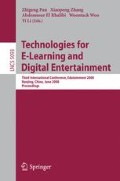Abstract
It is important for development of education game to get the correct balance and find the best hybrid mode between education and game. In this paper, the factor considered during the design of education game is discussed, and several hybrid modes of education and game are proposed. Specifically for elementary historical education, the paper research on education game scheme of network role-play from the perspective of educational psychology, and design a case of historical education game using RPG mode with fully considering of knowledge and education. Players experience history by historical role-play, convey the sentiment of history by communication of players, and do with the hybrid integration of the game and education.
Access this chapter
Tax calculation will be finalised at checkout
Purchases are for personal use only
Preview
Unable to display preview. Download preview PDF.
References
Becker, K.: Teaching with games: The minesweeper and asteroid experience. Journal of Circuits, Systems and Computers 17(2), 23–33 (2001)
Coyne, R.: Mindless repetition: Learning from computer games. Design Studies 24(3), 199–212 (2003)
Durkin, K., Barber, B.: Not so doomed: Computer game play and positive adolescent development. Applied Developmental Psychology 23, 373–392 (2002)
Squire, K.: The Games-to-Teach Research Team. Design Principles of Next-Generation Gaming for Education. Educational Technology 43(5), 17–23 (2003)
Virvou, M., Katsionis, G., Manos, K.: Combining software games with education: Evaluation of its educational effectiveness. Educational Technology & Society 8(2), 54–65 (2005)
Author information
Authors and Affiliations
Editor information
Rights and permissions
Copyright information
© 2008 Springer-Verlag Berlin Heidelberg
About this paper
Cite this paper
Wu, H., Wang, X. (2008). Study of Game Scheme for Elementary Historical Education. In: Pan, Z., Zhang, X., El Rhalibi, A., Woo, W., Li, Y. (eds) Technologies for E-Learning and Digital Entertainment. Edutainment 2008. Lecture Notes in Computer Science, vol 5093. Springer, Berlin, Heidelberg. https://doi.org/10.1007/978-3-540-69736-7_45
Download citation
DOI: https://doi.org/10.1007/978-3-540-69736-7_45
Publisher Name: Springer, Berlin, Heidelberg
Print ISBN: 978-3-540-69734-3
Online ISBN: 978-3-540-69736-7
eBook Packages: Computer ScienceComputer Science (R0)

